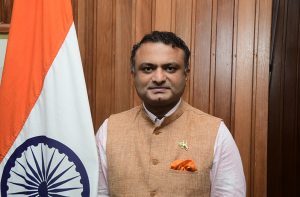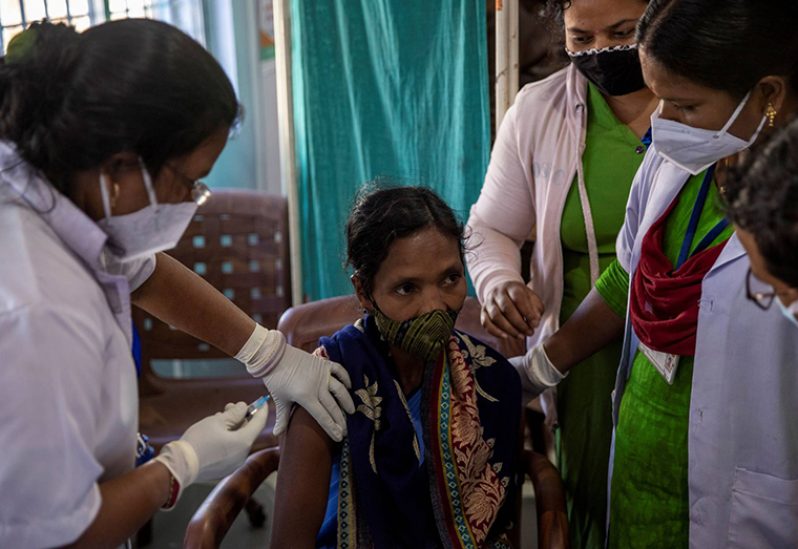By Vishani Ragobeer
GUYANA and several other Caribbean countries will benefit from an initial donation of 500,000 Oxford-Astrazeneca vaccines by the Government of India, as the South-Asian country ‘ups the ante’ on its vaccine-diplomacy efforts.

Guyana Dr K. J. Srinivasa
On Monday, during a virtual engagement with members of the media, Indian High Commissioner to Guyana Dr K. J. Srinivasa noted that a quantity of these vaccines are already being transported to Barbados and Dominica. These countries, he explained, were among the first to engage India on securing vaccines.
“I am working closely for the number of vaccines for Guyana, Antigua, St Kitts and many other countries in the Region,” Dr Srinivasa highlighted.
Currently, the High Commission is working with the local health authorities to get approval for this Oxford-Astrazeneca vaccine, which is called Covishield in India. And Dr Srinivasa also highlighted that information on the quota of vaccines Guyana will receive should be made known in a “couple of days.”
The Oxford-Astrazeneca vaccine is reportedly 62 per cent effective. However, it is also reportedly 90 per cent effective with a lower dose than the required two doses.
The High Commissioner, who is also India’s representative to the Caribbean Community (CARICOM), said that India is trying to work out a common procedure whereby the Caribbean countries can work in tandem for this approval process.
While the 500,000 vaccines being donated to the Caribbean is just an initial amount, Dr Srinivasa emphasised that India wants to provide some support to all of the “friendly countries” in the Region. This, he explained, is a core component of India’s vaccine- diplomacy efforts.
PHARMACY OF THE WORLD

of Bharat Biotech, Suchitra Ella
India is a renowned manufacturer of vaccines and has been dubbed the ‘pharmacy of the world.’ Beyond the Oxford-Astrazeneca vaccine, which is being manufactured by the Serum Institute in India and is already being distributed in that country, there are about five other vaccines being developed in India.
The Covaxin vaccine, being manufactured by Bharat Biotech International Limited (BBIL), is one such vaccine. This vaccine has already been granted emergency-use authorisation in India and is being distributed to health workers, though its clinical trials are not yet complete.
Obtaining vaccines from this country is not limited to those doses being donated, however. There are also avenues for governments to purchase vaccines from India.
“Our external supplies which are either gifts or commercial supplies are based on our domestic requirements, but we continue to work closely with our partner countries and we are preparing a schedule [whereby] in the coming weeks and months in a phased manner, these countries will get their vaccines,” Dr Srinivasa said.
The country has been donating several million vaccines to a number of countries as of this year.
‘BHARAT BIOTECH’ VACCINES
During Monday’s engagement as well, Co-founder and Managing Director of Bharat Biotech, Suchitra Ella indicated that Guyana can purchase vaccines from this company.
“We at the High Commission have already sent the details of the Bharat Biotech vaccine to the Ministry of Health in Guyana… we also offered them any assistance if required to put them in contact with Bharat Biotech,” Dr Srinivasa related.
Importantly, both the Oxford-Astrazeneca vaccine and the Covaxin vaccine do not require cold or ultra-cold storage like the Pfizer and Moderna vaccines. They can be stored in a normal refrigerator, between two to eight degrees, which make them easier to distribute and more suitable for global south countries such as Guyana.
The storage of vaccines in higher temperatures, as opposed to the cold or ultra-cold storage, makes it easier to transport the vaccine doses to rural and hinterland regions. This would be particularly necessary in Guyana.
Both of these vaccines are also two-dose vaccines, meaning that once an individual receives one dose of the vaccine, the individual will have to return sometime after to acquire the second dose.
Altogether, thus far, Guyana has been able to secure 273,000 vaccine doses which could be used to immunise some 136,500 individuals, or approximately 18 per cent of the population. The government is in talks with India, Russia and China in addition to a number of multilateral agencies and manufacturers of the vaccines, to secure more for the population, since vaccines are the means of exiting the pandemic.
The Health Minister has continuously emphasised that the vaccines will be used to immunise frontline workers, the elderly and persons with co-morbidities (other underlying medical conditions) first. There are about 22,000 healthcare workers who are all eligible to receive the vaccines, while the remainder will go to the other two groups.




.png)









